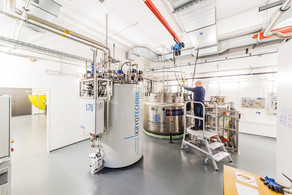Thesis defense of Sara Carina Fedosejevs
- Defense
Phase transitions in biological systems are controversially discussed. As the origin of nonlinearities, they have been suggested responsible for cellular functions including nerve pulse propagation. In pure lipid interfaces characteristic functions, such as permeability, are modulated during a transition. These relations could have drastic implications for cells because their membranes are lipid-based. However, evidence for these transitions in cellular membranes of excitable cells - which are involved in the transmission of nerve pulses - has not been provided so far. Within this thesis thermodynamic phase states in lipid-based interfaces are characterized based on the use of a fluorescent dye (Atto488-DPPE) as local state reporter. Optical state diagrams of artificial, lipid interfaces are recorded, and state dependent kinetics investigated. Upon the straightforward application of this method to single, neuronal cells, a nonlinearity in the optical response is detected within the cellular membrane and identified as phase transition. The transition is extraordinary sharp (1°C) and sensitive to pH variations in the extracellular buffer. The existence of distinct physical phase states in cellular membranes and their highly nonlinear characteristic provides strong evidence that the membrane state is indeed crucial for excitability and conduction of nerve pulses. The results further underline that the membrane state has the potential to modify cell functionality in general as it is subject to modulation by physiologically
important parameters such as pH.









